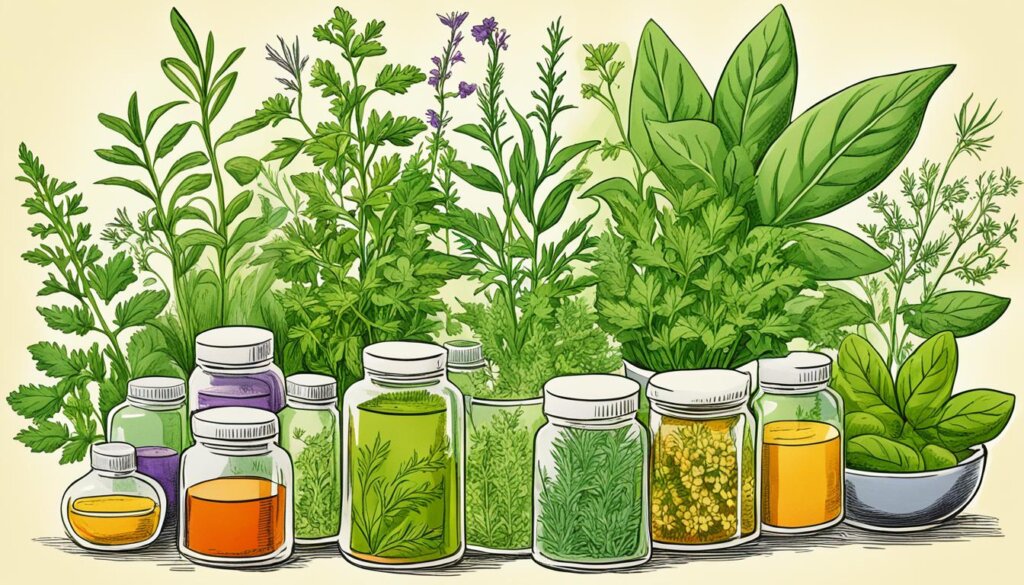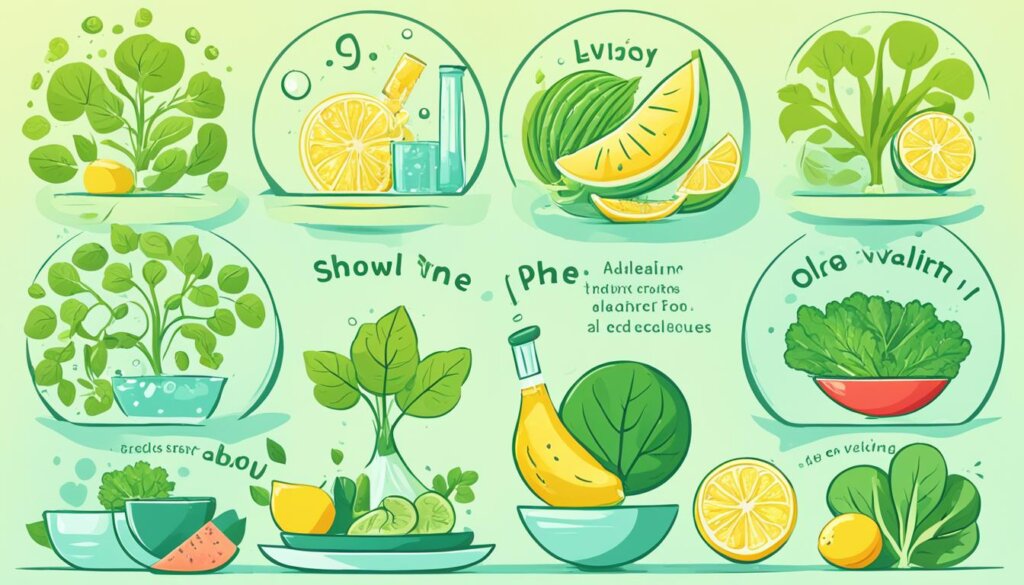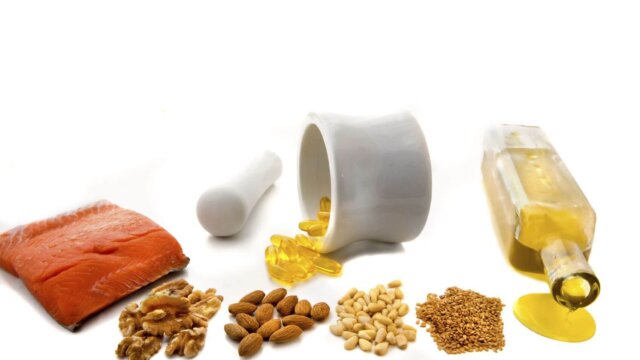FTC disclaimer: This post may contains affiliate links and we will be compensated if you click on a link and make a purchase.
One common at-home remedy for heartburn is over-the-counter antacids, usually with calcium. If heartburn happens often or if you use antacids for more than two weeks, talk to your doctor.
They can check for serious problems, like GERD or ulcers. Some people may develop issues like esophagus inflammation, strictures, and maybe even cancer due to frequent heartburn.
Key Takeaways
- Antacids containing calcium are a common natural remedy for heartburn
- Frequent or prolonged use of antacids may indicate an underlying condition like GERD
- Severe or persistent heartburn can lead to serious complications like esophageal damage
- Natural remedies like herbs and supplements may provide relief, but research is limited
- Lifestyle changes like diet, weight management, and quitting smoking can help manage acid reflux
What is Acid Reflux and Heartburn?
Heartburn feels like a burning pain in the chest. It’s not related to the heart itself. It happens due to acid reflux. This is when the muscle at the base of the esophagus doesn’t close properly. Stomach acid moves up, irritating the esophagus. This causes pain and could lead to bigger problems.
Understanding the Causes and Symptoms
Several things can cause acid reflux. This includes certain foods, smoking, and being overweight. In the U.S., about 20% of people have a chronic form called GERD. Another common cause is a hiatal hernia, which is more likely in older people.
The pain in your chest is a key sign of acid reflux and heartburn. You might also taste something bitter, have trouble swallowing, or your voice may sound hoarse. Sometimes, GERD can cause serious problems like esophagitis, Barrett’s esophagus, or esophageal cancer.
Being pregnant or obese can make acid reflux worse. Smoking and eating certain foods, like chocolate and garlic, can also be bad. These foods relax the muscle that should stop stomach acid from coming back up.
“Acid reflux and heartburn can really affect how you live each day. Knowing what causes them and their symptoms helps a lot. It’s key to handling and avoiding them.”
If you understand what makes acid reflux worse, you can do things to manage it. And if it gets too bad, seeing a doctor is a good idea.
Dietary Changes to Manage Acid Reflux
Acid reflux and GERD happen when acid flows back from the stomach into the esophagus. A weak or damaged lower esophageal sphincter is often the cause. Changing your diet can control acid reflux and protect your esophagus.
Foods to Avoid and Incorporate
Certain foods and drinks may make acid reflux worse by relaxing the LES. This makes it easier for stomach acid to move back up. Foods high in fat and sugar, like fried foods and chocolate, can up the risk. Meanwhile, veggies are low in both fat and sugar. Also, acidic foods like citrus fruits, tomatoes, and sodas can make symptoms worse.
Choosing low-fat, high-protein foods and chewing non-mint gum can help. These actions boost saliva, which can keep acid at bay. Oatmeal, a fiber-rich whole grain, absorbs stomach acid. It’s associated with fewer acid reflux episodes. When it comes to protein, opt for lean meats, seafood, and egg whites over fatty meats.
Tracking what you eat and your symptoms in a food diary can be very helpful. Knowledge about which foods and drinks affect you can guide your choices. This way, you can make big strides in managing your GERD diet and easing acid reflux discomfort.

“Certain foods can irritate the esophagus lining, particularly acidic foods like citrus products, spicy foods, and tomato products.”
It’s key to also watch out for certain habits that can worsen GERD. This includes drinking a lot of water during meals, late-night eating, not chewing well, and missing meals. Changing to a GERD-friendly diet and lifestyle is a major step. It helps with acid reflux and avoids problems in the future.
Lifestyle Modifications for Heartburn Relief
Changing how you live can really help with the pain of heartburn and acid reflux. If you smoke, stopping is key. Smoking can make a muscle in your throat weaker and cause more heartburn and reflux. Plus, cigarettes and vaping can also make that muscle even weaker, boosting GERD.
Staying at a healthy weight matters too. Too much belly fat can push stomach acid into your throat. Most people who lose weight and have lots of belly fat stop having heartburn.
Nearly 70% of obese folks have GERD, proving a healthy weight is important. Eating well and staying active can help you lose weight and ease acid reflux.
Quit Smoking and Manage Weight
Giving up smoking makes GERD symptoms better. Eating less fat and fewer calories can also cut down acid reflux. But, some people need more than just lifestyle changes and meds. They might choose surgery like Nissen fundoplication.
Lifestyle Modification | Impact on Acid Reflux |
|---|---|
Quit Smoking | Can improve GERD symptoms by preventing the weakening of the lower esophageal sphincter |
Manage Weight | A structured weight loss program eliminates heartburn for a majority of people with high levels of body fat |
Eat Smaller, Lighter Meals | Can cut down on acid reflux by not eating big, heavy meals that can squish your stomach |
These changes can really help people with acid reflux feel better. Around 20% of us deal with GERD, so these simple steps can truly make a big difference.

Avoid Certain Foods to Soothe Acid Reflux Symptoms
Avoiding certain foods and drinks is key to fighting acid reflux. Stay away from spicy, acidic, fried foods, and drinks like coffee, alcohol, and chocolate. Avoid eating close to bedtime and overeating to lower your risk of discomfort.
Also, sleep with your head and chest elevated. This can help keep stomach acid down. Quitting smoking can make a big difference too.
Some supplements and herbs might ease acid reflux. For example, DGL can reduce throat irritation. Psyllium supplements and melatonin might also help.
But, severe or ongoing acid reflux needs a doctor’s attention. If your symptoms are bad or happen often, see a healthcare provider. They can find the right treatment for you.
By changing what you eat, your habits, and adding natural aids, you can feel better. Work with your doctor to create a plan. This will help you manage your acid reflux and live more comfortably.
The Role of Herbs and Supplements
Research is still short on herbal heartburn fixes. Yet, products like Iberogast and supplements like melatonin show promise. They could lower acid reflux and help with gut issues. But experts are mixed on melatonin’s effects.
Ginger seems good for acid reflux and GERD by cutting heartburn and acid. However, too much ginger can actually cause heartburn. Antioxidant vitamins, A, C, and E might lower your GERD risk. Quercetin’s antioxidative powers could treat GERD too.
A study in 2023 found big health improvements when melatonin and omeprazole were used together. People had less GERD symptoms and better life quality after just 4 weeks.
Turmeric, caraway, garden angelica, and more might also help with GERD issues. But, we need more research to know for sure if these remedies work great.
Many people worldwide have GERD, affecting around 20% to 30% of the world’s population and 7.8% to 8.8% in East Asia. Popular GERD drugs, PPIs, help about 56% to 76% feel better and 80% to 85% heal the esophagus. Still, nearly 30% don’t respond well to PPIs and look to traditional Chinese medicine for help.
In studies, Jianpi therapy+PPIs and Ligan Hewei therapy did best at helping with GERD. Ligan Hewei therapy+PPIs works well for easing acid regurgitation and heartburn.
Always talk to your doctor before trying herbs or supplements. They might cause issues with your medications or have side effects.

Importance of Stress Management
Stress is a big factor in making acid reflux and GERD worse. People under stress might feel more severe symptoms or have ongoing GERD problems. Stressful situations can trigger acid reflux, making it hard for some to control it even with good diets and habits.
Although it’s not clear if stress makes the body produce more stomach acid, it could make someone feel like their symptoms are more severe. Stress changes brain chemicals, making us more sensitive to acid’s effects. Under stress, our body produces less of a substance that shields our stomach from excess acid, possibly making acid reflux worse.
This explains why it’s vital to manage stress when dealing with acid reflux. Stress leads us to do unhealthy things like eat too much, drink caffeine, or alcohol, which all make acid reflux worse. So, it’s key to add relaxation techniques to our lives to counter stress and its effects on acid reflux.
Relaxation Techniques for GERD
To lower stress for acid reflux management, try exercising, doing art, or talking to loved ones or therapists. Things like yoga, meditation, and deep breathing can lessen stress and make us more aware of our minds and bodies. Practices like mindfulness and yoga are suggested for less stress and better life quality while handling acid reflux.
“Mindfulness-based interventions have been shown to be effective in reducing the impact of stress on GERD symptoms, providing a natural and holistic approach to managing this condition.”
By adding these mind-body techniques to our daily lives, we can actively manage acid reflux and GERD, leading to a better quality of life.

Adjusting Sleep Position and Posture
The way you sleep matters a lot for acid reflux. Putting blocks under your bed’s legs or using a special wedge can stop stomach acid from going back up your throat. Raise your bed’s head at least 6 inches. This can ease your reflux symptoms while you sleep.
Sleeping on your left side can aid digestion and lower stomach acid reflux. But it might not be easy on every bed. For people with acid reflux, sleeping on their left side is better. It helps stop stomach acid from moving into the throat. By sleeping on the left, gravity helps keep reflux down.
After eating, don’t lie flat. This can help avoid reflux. Lying flat on your back can make acid reflux happen more often, especially if you have a lot of stomach fat around your LES. Sleeping with your upper body raised lessens the amount of reflux and helps clear it away faster.
Reflux is worse if you sleep on your right side. This can lead to the LES being in acid for too long. But when you sleep on your left, reflux is not as much or as strong. So, for acid reflux and GERD, sleeping on the left side is better. Plus, if you’re also slightly elevated, it can help even more.
Things like milk and gum can give you some quick relief from acid reflux. But, for both short and long times, drugs like antacids and PPIs are the best. It also helps to not eat foods that trigger your acid reflux, stay at a good weight, and give your food time to digest before sleeping.

“Prolonged acid exposure due to untreated reflux can lead to complications like erosive esophagitis, peptic strictures, esophageal ulcerations, Barrett’s esophagus, and, in rare cases, esophageal cancer.”
Sleeping Position | Impact on Acid Reflux |
|---|---|
Lying Flat | Increases frequency and duration of acid reflux symptoms |
Sleeping on Right Side | Acid reflux tends to be more liquid, submerging the LES in acidic stomach contents for longer periods |
Sleeping on Left Side | Reflux is milder and less frequent, making this position beneficial for acid reflux and GERD |
Elevated Left-side Position | Can significantly decrease nighttime heartburn symptoms |
In conclusion, how you sleep can greatly affect acid reflux and GERD. By raising your bed’s head, choosing to sleep on your left side, and not lying flat after eating, you can reduce how often and how severe your reflux is. These easy steps can help you feel better and avoid long-term problems from acid reflux.
When to Seek Medical Attention
If you get occasional, mild heartburn, try over-the-counter meds and home remedies. But if the heartburn happens often, is really bad, or sticks around despite treatment, see a gastroenterologist. Too much acid reflux can harm your health over time, even leading to serious issues like esophageal cancer.
Identifying Severe or Persistent Symptoms
If you have daily heartburn, find it hard to swallow, throw up, lose weight without trying, or start having heartburn after you turn 60, get checked by a doctor. The National Health Service says in the UK that if bad heartburn lasts for 3 weeks or more, you should see a doctor. Seek quick medical help if you notice any signs of bleeding or shock, like cold sweats and feeling faint.
About 2 out of 3 people with acid reflux don’t see any harm to their esophagus. But, if your symptoms are intense or keep coming back, don’t wait. Seeing a doctor can protect you from dangers and help you get the right care.

A doctor might suggest changes in your life, over-the-counter meds, or prescription drugs to help with acid reflux. Sometimes, surgery like fundoplication might be needed if the problem is bad or doesn’t go away.
“Acid reflux can have serious long-term consequences if left untreated, so it’s important to seek medical attention if you experience persistent or severe symptoms.”
Working with a healthcare expert to deal with acid reflux is smart. If you act early, you can live a better, healthier life with less worry about your acid reflux.
Combining Home Remedies with Medical Treatment
Home remedies work well for treating mild to moderate acid reflux. But, if it’s very bad or lasts a long time, you might need medicine. Many pregnant people, about 17–45%, get acid reflux. It happens because of more progesterone and pressure from the baby. You can use over-the-counter drugs or ones your doctor prescribes. This includes antacids, H2RAs, and PPIs.
Antacids help by making stomach acids less harmful. They come in different forms like tablets or liquids. They usually have ingredients such as aluminum hydroxide and magnesium hydroxide. H2RAs like cimetidine and famotidine stop your stomach from making too much acid. They block a chemical that tells your stomach to make acid. PPIs, which include omeprazole and esomeprazole, are strong acid reducers. They stop acid production deep in the stomach.
You can mix both home and medical treatments for the best results. Change your diet and habits, and take the right medicine. This will help you deal with acid reflux or GERD well. Change your habits: sleep with your head up, don’t eat late at night, wear clothes that don’t squeeze you, and avoid smoking or drinking.
If you keep feeling bad, like food sticking in your throat, or you lose weight without trying, you need to see a doctor. This could be a sign of GERD. You might need both home treatments and medicines to feel better.
Medication Type | Common Examples | Recommended Dosage |
|---|---|---|
Antacids | Aluminum hydroxide, magnesium hydroxide, calcium carbonate | Varies based on active ingredients |
Histamine-2 Receptor Antagonists (H2RAs) | Cimetidine, famotidine, ranitidine, nizatidine | Specific daily dosages for each medication |
Proton Pump Inhibitors (PPIs) | Dexlansoprazole, esomeprazole, lansoprazole, omeprazole, pantoprazole, rabeprazole | Varying recommended daily doses |
Antacids can quickly soothe your symptoms. But, they don’t fix the main problem. For long-lasting help, your doctor might give you PPIs. These can lower your stomach acid over time and help your throat heal. Don’t forget, some home remedies can also be good. Things like milk, ginger, and baking soda can work well with your medicine.
Using both home and medical treatments together is the best plan. You can then manage your acid reflux or GERD well and feel better. Always talk to your doctor about your symptoms. They can help you choose the right treatments.

Preventing Acid Reflux Recurrence
After finding relief from acid reflux symptoms, focus changes to stop them from coming back. This means sticking to diets and lifestyles that work. You should avoid certain foods, keep a healthy weight, and quit smoking. These daily habits can lower acid reflux risks and stop serious issues from happening.
It’s key to find and dodge your own trigger foods to keep acid reflux away. Spicy, fried, and acidic foods are usually the problem. Examples are citrus fruits, tomatoes, and fizzy drinks. Writing down what you eat can show you which foods make your symptoms worse. This way, you can choose what to eat more wisely.
Being overweight can also lead to acid reflux by pushing on your stomach and weakening a valve. Living healthy and losing extra weight is a big help. It can lower the pressure on your stomach. This reduces the chances of having acid reflux.
Stopping smoking is important, too. Smoking weakens a valve, letting stomach acid come up easier. It also hurts the throat, making acid reflux worse.
Learning to manage stress with activities like meditation, yoga, or deep breathing can prevent acid reflux. Stress can mess with your digestion and make acid reflux more likely.
If you change your lifestyle and keep at it, you can control acid reflux. Sticking to these changes is the best way to stay healthy and avoid acid reflux for the long haul.

Maintaining a Healthy Lifestyle
Staying healthy is crucial for dealing with acid reflux and stopping it from coming back. You should eat right, keep a normal weight by eating well and moving, stop smoking, and find ways to relax when you’re anxious. These changes in lifestyle help you lower your acid reflux problems. They also cut down the chance of worse issues linked to GERD.
Adopting Long-Term Habits
Keeping heartburn away means keeping up with good habits all the time. You need to watch what you eat, stay active, and handle stress well.
- Avoid spicy, fried, or acidic foods that make acid reflux worse.
- Stay at a healthy weight by eating right and moving more.
- Don’t smoke because it harms your body and triggers more acid.
- Try to relax with yoga, meditation, or deep breathing to ease stress, a key GERD problem.
- Eat small meals often to keep stomach acids from going back up.
- Wear loose clothes to avoid pressing on your belly, which can cause more heartburn.
- Choose foods high in fiber to digest better and have fewer heartburns.
- Use healthy fats, like monounsaturated and polyunsaturated, to feel better with GERD.
- Chewing gum or taking honey may ease heartburn by making more saliva and protecting the throat.
With these long-time habits, you can keep acid reflux under control. You’ll also lower the danger of serious GERD issues. Always remember, it’s important to focus on both what you eat and how you live to stay healthy and keep acid reflux away.

“Making healthy habits part of your everyday life is key for dealing with acid reflux and GERD for the long haul.”
Conclusion
Acid reflux and heartburn are common issues. They don’t have to be a constant source of discomfort. You can manage them by using natural remedies. These include diet changes, lifestyle changes, and relaxation techniques. But, for worse cases, you should see a doctor. You should still keep doing these things even with the help of a doctor.
It’s good to have a long-term plan to deal with acid reflux. This includes staying at a healthy weight, not smoking, and staying away from foods that make it worse. This can help you feel better and stop worse problems from happening. Mix natural remedies with doctor’s advice. Stick to good habits to control acid reflux. Doing this can make you feel better and healthier.
Using natural cures can really help. But, it’s key to talk to your doctor. They can make a plan that works best for you. This can help you face acid reflux and heartburn. You can lead a life that’s more comfortable and healthy.
FAQ
What is acid reflux and how is it different from heartburn?
Acid reflux happens when stomach acid flows back into the food pipe. This creates a painful feeling called heartburn. These two terms are often switched, even though they’re not exactly the same.
What are the common triggers of acid reflux and heartburn?
Foods like spicy and acidic choices, caffeine, chocolate, and alcohol can trigger it. So can smoking and being too heavy. It’s a good idea to keep a food log to pinpoint your personal triggers.
How can dietary changes help manage acid reflux?
Eating meals that are low in fat but high in protein may help. After eating, chew non-mint gum to feel better. And, steering clear of foods that trigger it can prevent acid reflux.
What lifestyle modifications can help relieve heartburn?
Kick the smoking habit and keep a weight that is healthy. Also, follow a diet and exercise that are balanced. These steps can make a big difference.
What are some natural home remedies for acid reflux relief?
Ginger, chamomile, and slippery elm are good options. You can use over-the-counter antacids too. Plus, avoid lying down right after eating and keep your bed’s head slightly raised.
Can herbal remedies and supplements help manage acid reflux?
Some supplements, like Iberogast and melatonin, show promise. Always talk to your doctor before you use any herbs or supplements for acid reflux.
How can stress management techniques help with acid reflux?
Learn relaxation tricks like yoga and meditation. They can lower stress and make you more aware. This might help with acid reflux.
When should you seek medical attention for acid reflux?
If you have really bad or long-lasting heartburn, trouble swallowing, or you’re throwing up, see a doctor. The same goes for sudden heartburn in people over 60, or if you’re losing weight without trying.
How can home remedies and medical treatment be combined to manage acid reflux effectively?
Mixing changes in what you eat and do, with meds from the store or a prescription, works well. This duo can really tackle acid reflux or GERD.
What are the key steps to preventing acid reflux recurrence?
Stick to a plan that includes what you eat and how you live to avoid acid reflux. Things like not eating trigger foods, a good weight, and no smoking are key. They help manage acid reflux and lower the chance of worse problems.








